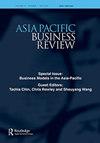The influence of the fit between strategic human resource management and CEO strategic leadership behaviours on organizational effectiveness in China
IF 1.9
4区 管理学
Q3 BUSINESS
引用次数: 1
Abstract
ABSTRACT Strategic human resource management and strategic leadership are both important factors affecting organizational effectiveness. However, few studies have organically integrated their influences on organizational outcomes. Drawing on social information process theory, this study proposed a variety of relationships between high performance work system (HPWS) and CEO relationship-focused leadership behaviours on organizational outcomes including firm performance, organizational-level affective commitment and employee overall turnover rate (e.g. strengthening effect, weakening effect, and substitution effect). Based on a matched data from vice presidents, human resource managers and employees in 182 Chinese firms, this study found the above three relationships between HPWS and CEO relationship-focused leadership behaviours on organizational outcomes. Specifically, when HPWS and CEO relationship-focused leadership behaviours were both high, firm performance and organizational-level affective commitment were higher, and employee overall turnover rate was lower; the effects of HPWS on organizational outcomes would not be significant when CEO relationship-focused leadership behaviours was low; when HPWS was low but CEO relationship-focused leadership behaviours was high, employee overall turnover rate was highest. This study contributed to the understanding of the relationship between ‘system’ and ‘renqing’ in the context of Chinese enterprises, integrated the research on strategic leadership and strategic human resource management, and had important inferences for management practice.战略人力资源管理与CEO战略领导行为的契合度对组织有效性的影响
战略人力资源管理和战略领导都是影响组织有效性的重要因素。然而,很少有研究有机地整合他们对组织结果的影响。本研究运用社会信息过程理论,提出了高绩效工作系统(HPWS)和CEO关系导向领导行为对企业绩效、组织层面情感承诺和员工整体流失率等组织结果的多种关系(如强化效应、弱化效应和替代效应)。本研究基于182家中国企业的副总裁、人力资源经理和员工的匹配数据,发现HPWS和CEO关系导向领导行为对组织成果的影响存在上述三种关系。具体而言,当HPWS和CEO关系聚焦型领导行为均较高时,企业绩效和组织层面情感承诺均较高,员工整体流动率较低;当CEO关系聚焦型领导行为水平较低时,员工绩效对组织成果的影响不显著;当HPWS较低而CEO关系导向领导行为较高时,员工整体流动率最高。本研究有助于理解中国企业背景下“制度”与“人情”的关系,整合了战略领导与战略人力资源管理的研究,对管理实践具有重要的借鉴意义。
本文章由计算机程序翻译,如有差异,请以英文原文为准。
求助全文
约1分钟内获得全文
求助全文
来源期刊

Asia Pacific Business Review
Multiple-
CiteScore
4.40
自引率
13.80%
发文量
70
期刊介绍:
The growth of the Asia Pacific region and the rising presence of its multinationals in world markets has raised a number of questions about the origins of national economic success. Asia Pacific Business Review addresses these key issues and draws together the lessons of the analysis of culture, economies, history, politics and societies in the area, in order to explore business-related phenomena in the Asia Pacific countries, both in their general and specific contexts. The Review is intended for both academics and interested observers, contains the contributions of recognized experts, and is essential to anyone seeking the latest research on Asia Pacific business in a readily available, approachable form. We welcome articles which deal with nations and societies in the Asia Pacific region, namely those in East Asia and South-East Asia (but not South Asia), including those in APEC and ASEAN, individually or comparatively. Of interest also are contributions on the Asia Pacific economies, comparing those inside with those outside, or those investing in it. We do not, however, publish papers based solely on countries from outside the region.
 求助内容:
求助内容: 应助结果提醒方式:
应助结果提醒方式:


